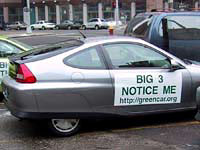To an extraordinary degree, the administration assembled by George W. Bush is made up of men and women with experience in the automobile and oil industries. With the energy crisis in California, such energy expertise at the helm, it would seem, must be a good thing.
Would that it were so. In reality, the Bush team is so tilted toward Big Oil that it will never give a thought to the only possible lasting solutions to our deepening problems: mass transit and energy conservation.
We Americans must really love our cars; we spend an hour a day in them. The average family takes 10 car trips a day, mostly for shopping, socializing, and recreation. For every 10 transit miles in the U.S., more than nine are taken in a car. Every year, we use up 100 billion gallons of oil, more than half of it (56 percent) imported. If present trends continue, we’ll be importing two-thirds of our oil in 20 years. That isn’t love — it’s addiction.

Living in an SUV-owner’s paradise.
If every American drove a 70-mile-per-gallon hybrid Honda Insight instead of a gas-guzzling sport utility vehicle, we could stop importing oil tomorrow, but that kind of thinking is not on the agenda. Both President Bush and Vice President Dick Cheney have backgrounds as oil executives — in fact, Cheney was plucked into the campaign directly from the helm of the Texas-based oil services giant Halliburton, which helped rebuild Iraq’s petroleum industry after the Persian Gulf War. And both Bush and Cheney support increased domestic drilling, most radically in the highly sensitive coastal plain of the Arctic National Wildlife Refuge in Alaska.
Bush raised a huge percentage of his campaign cash from oil and gas interests, including a record $21.3 million at a single fundraiser hosted by Kenneth Lay, chief executive of Enron, the largest natural gas dealer in the U.S. The industry’s giving followed the pattern of the 1998 election cycle, when 76 percent of the $22 million donated by oil interests went to Republican candidates.
They’ve Got So Much Energy!
The Bush administration is likely to adopt a hostile stance toward energy conservation in general and tax subsidies for clean vehicles in particular. Speaking at a recreational-vehicle plant in Washington state during the campaign, Cheney scored points with the audience when he mocked Democratic nominee Al Gore’s proposed tax credits for buyers of energy-efficient technologies: "You have a solar panel on your house, you get tax relief. If you drive a solar-powered car, you get tax relief. That’s goofy.”

Remember these?
During a Los Angeles stop in the early days of the 2000 presidential campaign, Bush listened to the complaints of a man who rode two slow buses to work every day and was seeking transit improvements. “My hope is that you will be able to find good enough work, so you’ll be able to afford a car,” offered a helpful Bush.
The auto industry has a direct pipeline to the Bush administration in the person of White House Chief of Staff Andrew H. Card, Jr. From 1993 to 1998, Card was the president of the American Automobile Manufacturers Association; in this position, according to the New York Times, “he oversaw the lobbying against tighter fuel-economy and air pollution regulations for automobiles.” From there, it was on to a vice presidency at General Motors.
And Card is only the beginning. National Security Adviser Condoleezza Rice, a former Chevron board member, has an oil tanker named after her. Commerce Secretary Donald Evans is another oil man. Energy Secretary Spencer Abraham, defeated this past November in his bid for re-election to the U.S. Senate from Michigan, twice co-sponsored Senate bills calling for drilling in the Arctic Refuge; voted against $62 million for solar and other renewable energy sources in the Energy Department budget; consistently opposed raising corporate average fuel economy standards for the auto industry; and, most famously, tried to abolish the Energy Department itself. Interior Secretary-designate Gale Norton is a protege of James Watt, the fierce foe of the environment who held the job under Ronald Reagan.
The list goes on. These are the foxes guarding the hen house of American energy and transportation policy. Meantime, we fight to the death for the last drop of imported oil, and our highways continue to gridlock with bumper-to-bumper SUVs.




